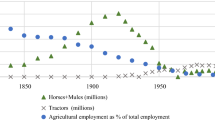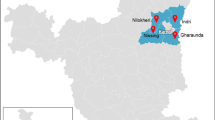Abstract
Lorenzo Cotula and Sonja Vermeulen examine the extent to which local people have control over the land allocation processes which have such enormous impacts on their livelihoods and cultures. They examine the procedural issues of consultation and consent, to examine how accountable current processes are to differentiated local interests, and at the distributive issues around compensation.
Similar content being viewed by others
Notes
Anonymous personal communications.
The lowest recordable level on the records sheet; most are likely to offer significantly fewer than 50 full-time employment (FTE) jobs.
See ILO Convention No. 169 of 1989 and the 2007 UN Declaration on the Rights of Indigenous Peoples. The UN Declaration is not a legally binding document, while ILO Convention 169 has been ratified by about 20 countries, none of which is in Africa. On free prior and informed consent (FPIC), see Colchester and Ferrari (2007).
References
Benetti, Paul (2008) ‘The Critical Importance of Feedstock’, Presentation at the Biofuels Markets East Africa Conference, Dar es Salaam, 17–18 September.
Borras Jr., Saturnino and Jennifer Franco (2010) ‘From Threat to Opportunity? Problems with the Idea of a ‘code of conduct’ for land-grabbing’, Yale Human Rights and Development Law Journal 13 (1): 507–523.
Colchester, Marcus and Maurizio Farhan Ferrari (2007) Making FPIC Work: Challenges and prospects for indigenous peoples, Moreton-in-Marsh: Forest Peoples Programme.
Cotula, Lorenzo and Paul Mathieu (eds.) (2008) Legal Empowerment in Practice: Using legal tools to secure land rights in Africa, London: International Institute for Environment and Development.
Cotula, Lorenzo and Sonja Vermeulen (2009) ‘Deal or No Deal: The outlook for agricultural land investment in Africa’, International Affairs 85: 1233–1247.
Cotula, Lorenzo, Sonja Vermeulen, Rebeca Leonard and James Keeley (2009) Land Grab or Development Opportunity? Agricultural investment and international land deals in Africa, London: International Institute for Environment and Development.
De Schutter, Olivier (2009) ‘Large-scale Land Acquisitions and Leases: A set of core principles and measures to address the human rights challenge’, UN Special Rapporteur on the Right to Food, reporting the UN General Assembly (Third Committee) and the Human Rights Council of the United Nations, http://www.srfood.org/index.php/en/component/content/article/1-latest-news/127-human-rights-principles-to-discipline-land-grabbing, accessed 27 September 2010.
Djiré, Moussa (2007) ‘Land Registration in Mali – No land ownership for farmers? Observations From Peri-urban Bamako’, Drylands Issue Paper 144, London: International Institute for Environment and Development.
Egbe, Samuel Egbe (2001) ‘The Concept of Community Forestry under Cameroonian Law’, Journal of African Law 45: 25–50.
FIAN (2010) Land Grabbing in Kenya and Mozambique – A Report on Two Research Missions – And a human rights analysis of land grabbing, Heidelberg: FIAN.
Firmin-Sellers, Kathryn and Patrick Sellers (1999) ‘Expected Failures and Unexpected Successes of Land Titling in Africa’, World Development 27: 1115–1128.
Glass, Amy (2009) Madagascar – Island up for Grabs? People and Development [online] Canberra: Australian National University, http://peopleanddevelopment.weblogs.anu.edu.au/2009/04/25/madagascar-island-up-for-grabs/, accessed 27 September 2010.
Kasanga, Kasim and Nii Ashie Kotey (2001) Land Management in Ghana: Building on Tradition and Modernity, London: International Institute for Environment and Development.
MAFFS (2009) Investment Policies and Incentives for Private Sector Promotion in Agriculture in Sierra Leone, Freetown: Ministry of Agriculture, Forestry and Food Security, Government of Sierra Leone.
McAuslan, Patrick (2010) ‘Ensuring Access to Land for Private Investors’, in Klaus Deininger, Clarissa Augustinus, Stig Enemark and Paul Munro-Faure (eds.) Innovations in Land Rights Recognition, Administration, and Governance pp 149–156, Washington, DC: World Bank.
McCarthy, John F. (2010) ‘Processes of Inclusion and Adverse Incorporation: Oil palm and agrarian change in Sumatra, Indonesia’, Journal of Peasant Studies 37: 821–850.
Nhantumbo, Isilda and Alda Salomão (2010) Biofuels, Land Access Rural Livelihoods in Mozambique, London: International Institute for Environment and Development.
Richardson, Ben (2010) ‘Big Sugar in Southern Africa: Rural development and the perverted potential of sugar/ethanol exports’, Journal of Peasant Studies 37: 917–938.
Schoneveld, George C., Laura A. German and Eric Nutakor (2010) ‘Towards Sustainable Biofuel Development: Assessing the local impacts of large-scale foreign land acquisitions in Ghana’, paper presented at the World Bank Land Governance Conference, 26–27 April.
Sulle, Emmanuel and Fred Nelson (2009) Biofuels, Land Access and Rural Livelihoods in Tanzania, London: International Institute for Environment and Development.
Tanner, Christopher and Sergio Baleira (2006) ‘Mozambique's Legal Framework for Access to Natural Resources: The impact of new legal rights and community consultations on local livelihoods’, FAO LSP working paper no. 28, Food and Agriculture Organization of the UN: Rome.
Teyssier, André (2010) ‘Décentraliser la Gestion Foncière ? L’expérience de Madagascar’, Paris: CIRAD, http://www.cirad.fr/content/…/4/…/Persp04_Teyssier_foncier_madagascar_fr.pdf, accessed 1 October 2010.
World Bank (2010) Rising Global Interest in Farmland: Can it yield sustainable and equitable benefits? Washington, DC: World Bank, http://siteresources.worldbank.org/INTARD/Resources/ESW_Sept7_final_final.pdf, accessed 1 October 2010.
Zoomers, Annelies (2010) ‘Globalisation and the Foreignisation of Space: Seven processes driving the current global land grab’, Journal of Peasant Studies 37: 429–447.
Acknowledgements
This is a revised and updated version of an earlier article published in the Journal of Peasant Studies (Vermeulen, Sonja and Lorenzo Cotula (2010) ‘Over the Heads of Local People: Consultation, consent, and recompense in large-scale land deals for biofuels projects in Africa’, Journal of Peasant Studies 37: 899–916). The original empirical work was coordinated by the International Institute for Environment and Development (IIED), the Food and Agriculture Organization of the UN (FAO) and the International Fund for Agricultural Development (IFAD), with funding from IIED's multi-donor framework agreement (Danida, DFID, DGIS, Irish Aid, Norad, SDC, Sida), FAO and IFAD. The authors thank anonymous reviewers for their constructive comments on earlier versions.
Additional information
Examines the problem of inadequate compensation for local people in Africa
Rights and permissions
About this article
Cite this article
Cotula, L., Vermeulen, S. Contexts and Procedures for Farmland Acquisitions in Africa: What outcomes for local people?. Development 54, 40–48 (2011). https://doi.org/10.1057/dev.2010.94
Published:
Issue Date:
DOI: https://doi.org/10.1057/dev.2010.94




